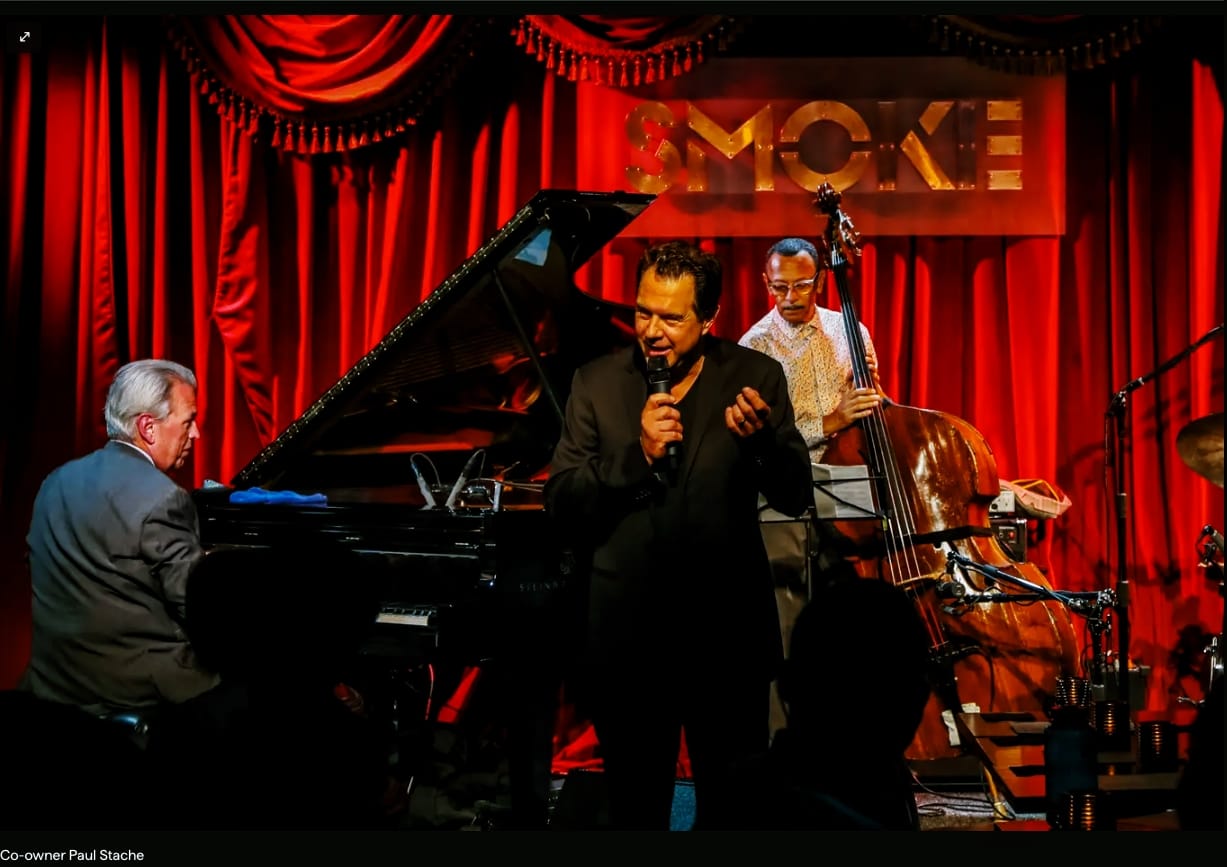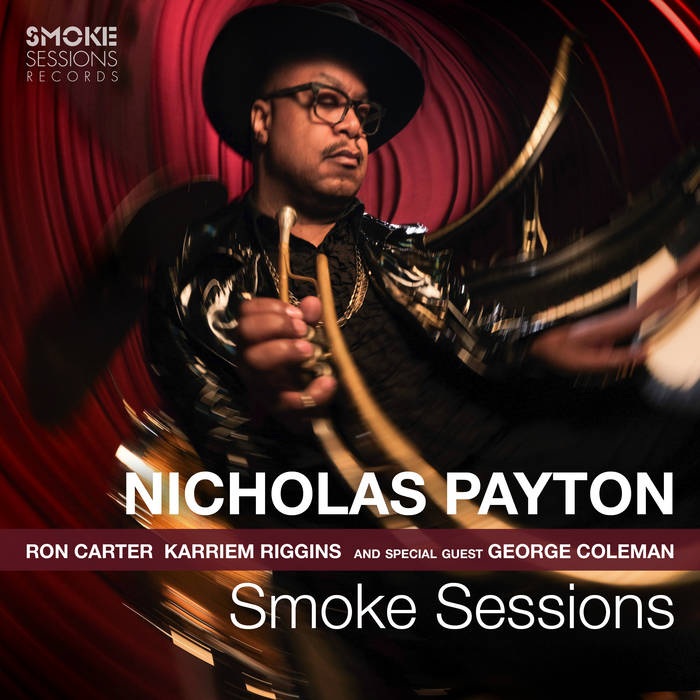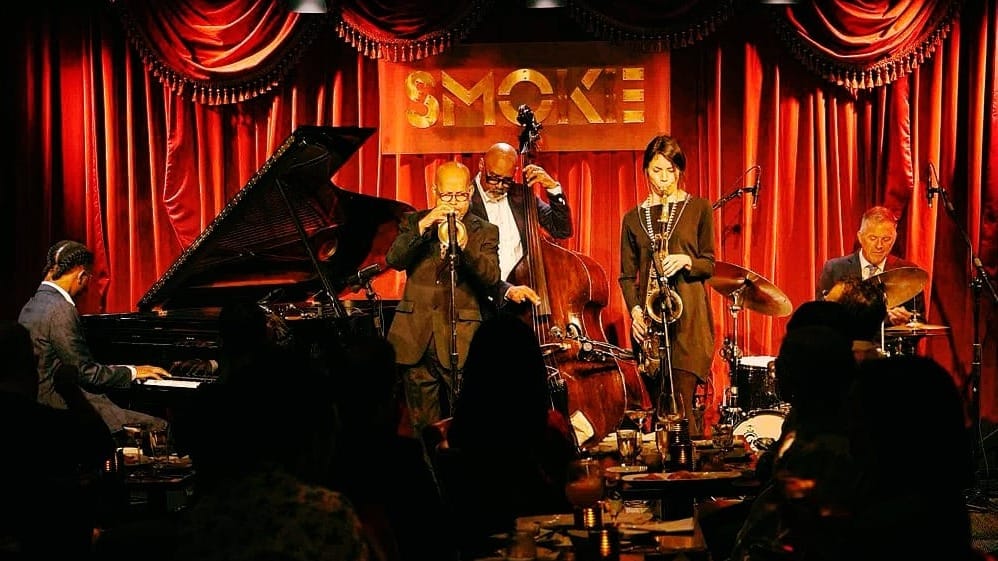Any live music venue that lasts twenty-five years has accomplished something significant, especially an intimate jazz club in Manhattan. Smoke Jazz Club has done just that. Located in Manhattan's Upper West Side, the world-renowned Smoke is co-owned by Paul Stache and his wife, Molly Sparrow Johnson, and inhabits the former space of Augie's Jazz Bar. Paul, an East German expat, bartended at Augie's and fused that experience with a love for jazz and a background in sound engineering to operate Smoke Jazz Club since 1999.
Smoke was on a razor's edge during the COVID-19 pandemic. Forced to close temporarily in March 2020, Stache and the club responded with innovation. The club offered high-quality virtual concerts and casual sidewalk performances to keep the music going and Smoke active. The closure also allowed time for renovations to Smoke, which expanded its capacity and upgraded its facilities, including the sound system. Smoke Sessions Records, a label formed from the club in 2013, also kept Stache and his team busy.
Smoke Jazz Club is inarguably better than ever. It proudly serves jazz aficionados who desire a live, traditional sound in a chic and amiable setting. Again, twenty-five years is nothing to sneeze at, and from the look of things, Smoke has no plan to stop the music any time soon.
Lawrence Peryer recently sat down with Paul Stache on the Spotlight On podcast to discuss Smoke's impressive longevity. The conversation also touches on the club's anniversary plans, the label's initial reluctance to embrace streaming, the challenges of running an independent venue, and reminiscences of great artists who have graced the stage at Smoke. The conversation has been lightly edited for space and clarity, and you can listen to the entire interview in the podcast player below.
Recording the Road-Tested
Lawrence Peryer: What are the hats in common between running the record label Smoke Sessions Records and booking a venue?
Paul Stache: The club started quite a bit earlier, but the record label grew organically out of the club. Initially, before the pandemic, we had music seven nights a week. When you have that much music coming through the club, you can experience live music being road-tested and see how the audience responds. You have great groups coming through, and I can say, "Hey, this is a special one. How do we feel about recording that?"
Sometimes, we do it the other way around and say, "Let's put a group together with the idea that perhaps a recording can grow out of this." We consider who the players will be to play that music best, and we usually bring the band into the club for a four- or five-night engagement. Sometimes, we record them live, but often, they just play the music for five nights. On Tuesday, we go into the studio and record a session. You can take some of that energy on the bandstand into the studio because they just played that music.
Lawrence: What does it mean to be a record label in 2024?
Paul: It's a labor of love, no doubt about it. What's the saying? How do you make a million dollars in the jazz record business? You start with ten. [laughter]
When Smoke Sessions started ten years ago, we almost launched with a format I don't think the world was quite ready for. The vision back then was just digital downloads and vinyl LPs. We ended up doing CDs, which were our primary market for the first five years of our business. CD sales are unique to jazz and classical music because of the demographics.
Five years in, digital downloads were something that we weren't sure would survive. We were skeptical of the streaming world, not because of the concept but because of the royalty rates. We weren't quite sure if that would ever add up. But then I bought a new iMac, which didn't come with a disc drive. I knew we were in trouble. [laughter]
I looked at some of the younger artists on our roster, and I thought that if they wanted to reach audiences under the age of forty-five, they had to be on Spotify and Apple Music to make new fans and have new audiences. There was a lot of criticism when we fully embraced the streaming world because there were concerns about how small jazz record labels would survive with those royalty rates. But we felt the train would leave the station with or without us. None of the DSPs will care if we put our records up there, but the artists will.
So, we're constantly reevaluating. We have re-embraced the vinyl market and are putting all our releases on vinyl.
Lawrence: The streaming services live in this weird netherworld between being a format and a media. It's like they're kind of like radio but also like a CD. If you view them like radio, it's a great marketing vehicle. And if some pennies trickle in, wonderful. But if it replaces your format, it's much more problematic.
Do you have much of a direct-to-consumer retail business, which allows you to have ongoing relationships with the audience?
Paul: We sell our CDs and vinyl LPs directly to consumers, and I think there's been a movement in that direction. Many people know our Bandcamp shop and buy every product there; sometimes, they buy multiple copies. Buyers realize it's going directly to a small business and take pride in that.

Standing Still is Not an Option
Lawrence: How did you get it to the point where you could sustain livestream broadcasts from the club? If you don't sell enough tickets in advance, do you just not flick the switch? How viable is it?
Paul: I felt strongly that our livestreams have to look and sound good. We invested quite a bit of money in the initial setup to stream in HD and have six camera angles and moving cameras and all that stuff. I wish I could base it on advance ticket sales. Many of those sales are last minute.
The way for me to justify it financially is we have a record label, and we still do quite a few live dates at the club, so having a good video of the artist is crucial. If I put that record out, I want to have a video to coincide with it. Even if I end up not making a record, that artist might come into the club again six or twelve months later, and now I have a high-quality video to promote that next performance. It's a promotional tool that promotes the venue and the artist.
Lawrence: I can't imagine it's bad to document such great material and capture these artists. Maybe, in some cases, the opportunities will present themselves. It seems like if you can do it, why not do it?
Paul: That's right. In a way, too, it's an additional perk for the artists. They get that footage afterward and can use it however they'd like. As a small venue, we must make our offers to our artists as attractive as possible. We can't compete with seats that have two or three hundred capacity. For instance, having a good piano is one way to do that. Having a good sound system, having the artists feel comfortable up there with a good microphone collection, and having a good sound engineer are things that artists will appreciate.
Lawrence: You mentioned the capacity. Your venue and growth have always blown my mind. You've increased capacity, obviously, but not at the expense of intimacy. You've made it work.
Paul: A real challenge for our team and me is figuring out how to keep it affordable for people because New York has become ridiculously expensive. At the same time, we want to make sure that we can pay our artists a decent wage and find that balance between a ticket price that pays the band and a ticket price that allows all types of people to enjoy live music.
When we reopened, we implemented different sections in the club where the music charge varies from a top-tier ticket to a ticket at times 75 percent less. We have premium seating right up front and seating with a side view of the stage. Then, we have standard seating. And then we have this little section, a quirky little standing room that the Fire Department of New York approved us to have. Standing room is very regulated in New York.
So it's not the ideal setup for a standing-room area, but it has great sightlines of the stage. On a night when a ticket in the premium seating costs $55, you can get that ticket for $20. It allows students, young musicians, or people who can't pay $55 for a ticket to experience live music. We think it's really important.
Lawrence: It sounds like a real sensitivity to your responsibility as a business owner, your commitment to the artist, and providing a good audience experience. I imagine that level of consideration contributes to why you're here—you don't stay in business like that for twenty-five years by not thinking about the constituents' needs.
Paul: Standing still is not an option. The club is not a static concept. You must look at, reevaluate, and change things over time. What may work in one decade may not work in the next.
Catching the Late Set
Lawrence: You mentioned the importance of your investment in the club's piano. Piano seems to be having a moment. Looking back over twenty-five years, do certain instruments have their moments and then recede?
Paul: I wouldn't have noticed a musical trend by instrument. I can tell you that we've had some incredible pianists come through the club. The one that will first come to mind is the late great Harold Mabern, who performed on opening night in 1999 and was one of our biggest supporters. He was an incredible musician, an even greater human being, and somebody who recorded for us. He was the first record we ever released. We were really lucky to have him.
Many giants of this music came through the club, many of whom were pianists, and many are still: Larry Willis and Ronnie Matthews. The Cedar Walton Trio used to come through and was magic. We have an incredible lineup of pianists coming through the club this summer, from Cyrus Chestnut to Eric Reed, Vijay Iyer, and Kevin Hays.
One of my favorite formats at the club, purely in a musical sense, is the Piano Trio because it is not always the most popular format for ticket sales. When we opened twenty-five years ago, one of my first ideas was to have a Piano Trio night on Thursday nights. We had some incredible shows and some successful ones, but they are not always the most popular format. I think that in a jazz club, people appreciate a horn player with a band, and that's great. We're very lucky to have this weekend, for instance, the great Nicholas Payton coming through, a trumpeter and multi-instrumentalist.

Lawrence: I think about the nature of competition with venues, and it can be sort of zero-sum, right? If two rock bands are playing at two different clubs—maybe somebody's at Bowery Ballroom, and somebody's in a room out in Brooklyn—I can probably only go to one of those shows. But I remember so many times in New York, because of the nature of jazz clubs and multiple sets, catching a show at your place or Jazz Standard, then hopping in the taxi, going downtown, and catching a late set at the Blue Note. Those were incredible New York nights, zipping around and seeing these world-class musicians. The formats of the shows have established themselves over the years in sixty-, seventy-, and eighty-minute sets, with the ability to do an early and a late. The business needs multiple sets a night.
Paul: I was one of those people, too, and I think that still happens. That's, in a nutshell, maybe less of a competitive field than some people think it is. People still go to Smoke for the first set, grab dinner, and then see the late set at the Vanguard, Birdland, or Smalls. That happens all the time. Ultimately, the jazz audiences are loyal. They love this music and will do exactly what you mentioned.
Lawrence: Smoke Jazz Club is in the middle of its twenty-fifth-anniversary festivities. What are you doing differently, or how are you dressing up what you do in the context of a celebration?
Paul: My goal is to bring as many artists to the club as possible who were involved in the early years when we first opened. At the same time, my other priority is to have as many Smoke premieres this year as possible. It's always great to bring new people in. We felt it was important to celebrate the legacy artists who have played in Smoke for almost twenty-five years and bring those back in.
An exciting thing is bringing them together onto one stage. It's special to group some legacy artists with young, thriving stars, and you have intergenerational bands. When you have a twenty-two-year-old musician just coming out of Juilliard with all the chops in the world, together with an octogenarian—audiences respond well to that.
Lawrence: Do you get the opportunity to develop those pairings? Or are musicians walking in the door, coming to you, saying, "We want to do this thing, and we'd like a place to present it"?
Paul: Both scenarios happen. I have close relationships with many artists who come through the club. We also have a record label and have artists record for our label. I enjoy doing it, but it has to make sense musically. Ultimately, it's the decision of the artists they want to play with. I might have an idea, and they say, "Yeah, I like that idea, but let's come up with something different that might work."
Visit Smoke Jazz Club online at smokejazz.com and follow the club on Instagram, Facebook, and YouTube. Check out Smoke Sessions Records at smokesessionsrecords.com or on Bandcamp.






Comments